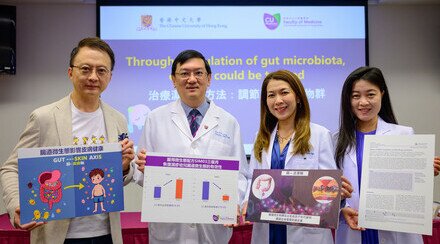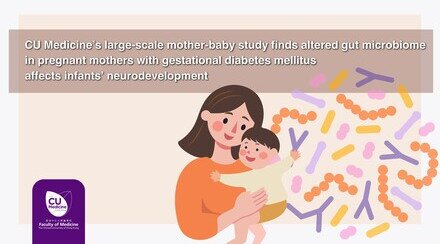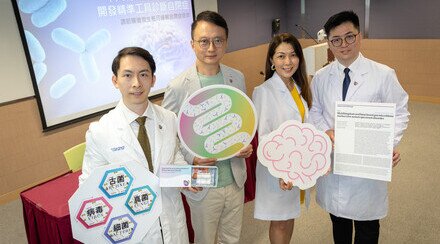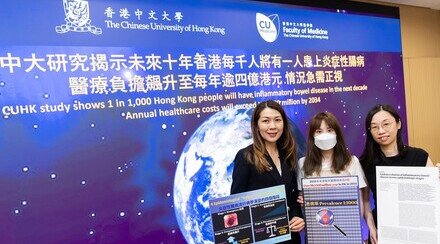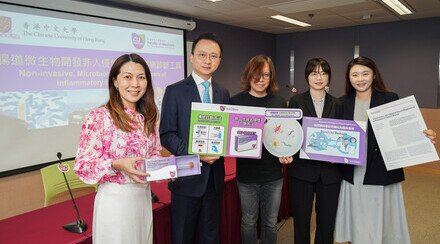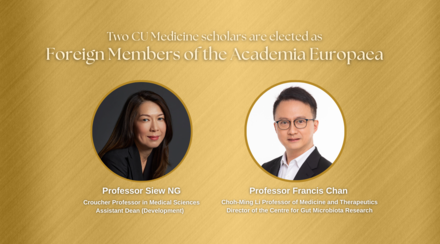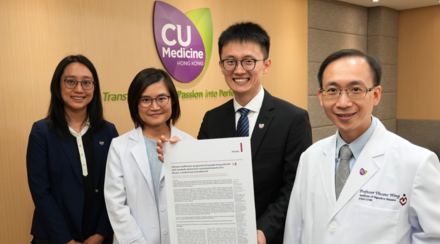The Helmsley Charitable Trust Funds Asian Research into Babies’ Gut Microbiota and Crohn’s Disease

CU Medicine is conducting a research to study gut microbiota of pregnant mothers and babies to assess how early life exposures can influence the child’s health and be harnessed for disease risk prediction, prevention and treatment. (From right) Prof. Francis KL CHAN, Dean of the Faculty of Medicine and Director of the Centre for Gut Microbiota Research; Prof. Siew Chien NG, Associate Director of the Centre for Gut Microbiota Research; Prof. Tak Yeung LEUNG, Chairman of the Department of Obstetrics and Gynaecology of CU Medicine.
CU Medicine pioneers gut microbiota research in Asia
Professor Francis KL CHAN, Dean of the Faculty of Medicine and Director of the Centre for Gut Microbiota Research, said, “The Helmsley Charitable Trust is a prestigious foundation based in New York. Over the past ten years, Helmsley has supported many health initiatives in the U.S. and around the world. CU Medicine is the first in Asia to be supported by Helmsley. We are excited to receive a second sizable research grant from Helmsley to find out how microorganisms in the gut (gut microbiota) affect child development.”
“As Crohn’s disease incidence rises globally, particularly in countries where previously there were no known cases, Helmsley is investing in research to help uncover the disease’s root triggers and better understand the course of disease development,” said Dr. Shefali Soni, a Program Officer at the Helmsley Charitable Trust. “CU Medicine is leading critical Crohn’s disease research in Asia, and this initiative is intended to bring us closer to our goal of improving patients’ lives while pursuing cures.”

Prof. Francis CHAN says that building beneficial gut microbiota during early childhood will positively influence health of future generations
Crohn’s disease is a life-long disabling condition of the gut that generally commences in childhood or early adult life. The incidence of Crohn’s disease has risen in various areas of the world, particularly in children living in developed nations and adults and children in newly industrialized countries. The exact causes of Crohn’s disease are unknown but increasing evidence suggests that maternal health, perinatal environmental exposures and microbial colonization during early-life exert marked effects on immune and metabolic programming in the baby with long-term health related consequences, including the predisposition to Crohn’s and other immune mediated diseases. This grant will support CU Medicine to further study the impact of early life microbiota on health and disease transmission.
Professor CHAN added, “Increasing evidence suggests that the impact of gut microbiota on health is as important, as the human genome – maternal health and environmental factors such as diet and food additives affect the gut microbiota of infants. Building beneficial gut microbiota during early childhood will positively influence health of future generations.”
Professor Siew Chien NG, Associate Director of the Centre for Gut Microbiota Research, remarked, “We are tremendously grateful to the generous support from the Helmsley Charitable Trust. We will identify microorganisms transmitted from mothers to offspring during pregnancy, study the effects on the development of the immune system in early childhood, and develop novel interventions to manipulate the microbiome. This study will make fundamental discoveries of immediate relevance to our patients.”
“MOMmy-CD (Mother-to-Infant Transfer of Bacteriome, Virome, Fungome and Metabolome in health and Crohn's disease), a prospective longitudinal study, recruits healthy pregnant women and pregnant women with Crohn’s disease, their family members, and offspring. We will follow the babies for up to 18 months. Extensive clinical information and serial samples (parental stool, saliva, placenta, cord blood, meconium, infant stool, breast milk, and buccal swab) will be collected. This generous grant will help us explore new ways to translate the microbiome into medicine, to reduce the health burden of debilitating diseases in communities.”
The Department of Obstetrics and Gynaecology of CU Medicine is the leader in maternal fetal medicine in Hong Kong with outstanding scientific and clinical research achievements.
Professor Tak Yeung LEUNG, Chairman of the Department of Obstetrics and Gynaecology, said, “Our Department has been applying state-of-the-art technologies to improve care for mommies during pregnancy, and better monitor the health of foetuses. With increasing evidence supporting far-reaching health impact of microbiota on health of babies, we encourage more mommies to join our study. Participation will help us discover potentially alterable maternal and postnatal factors so as to reduce the risk of developing diseases.”
Details of the CU Medicine’s Mother-and-Infant Study will be presented at a public talk on 15 March 2020. For those who are interested, please register at https://forms.gle/u43BEs5w5YehzC6z8.
The Leona M. and Harry B. Helmsley Charitable Trust aspires to improve lives by supporting exceptional efforts in the U.S. and around the world in health and select place-based initiatives. Since beginning its active grantmaking in 2008, Helmsley has committed more than $2.5 billion for a wide range of charitable purposes. Helmsley’s Crohn’s Disease Program supports impactful ideas and mobilizes a global community committed to improving the lives of Crohn’s disease patients while pursuing a cure. For more information, please visit helmsleytrust.org.

Prof. Siew NG hopes their research can identify microorganisms transmitted from mothers to offspring during pregnancy, study the effects on the development of the immune system in early childhood, and develop novel interventions to manipulate the microbiome.

Prof. Tak Yeung LEUNG encourages pregnant women to join the MoMmy study. Participation will help the team discover potentially alterable maternal and postnatal factors so as to reduce the risk of developing diseases.





